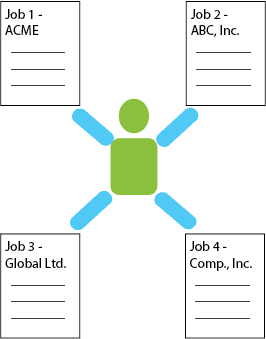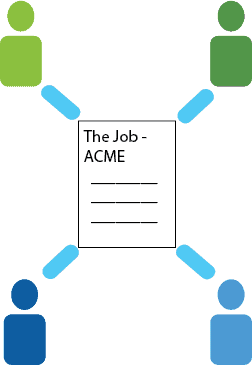When you begin the search for a recruiting software application that will best suit your company’s needs, it can be a challenging task to wade through all the options in today’s marketplace – especially if you aren’t yet sure which type of recruiting software solution will best match the recruiting orientation of your organization.
Whether you call it applicant tracking software, recruiting software, or talent acquisition software, etc., there are two core sets of solutions for hiring:
A recruiting software solution that is candidate-oriented
 This type of software is very resume-centric and the goal is to capture as many candidate resumes as possible, via a variety of means such as job fairs, resume searches within paid job board accounts and proactive recruiting (aka “headhunting”). Then, advanced keyword searches are done on the pool of candidates and specific resumes are matched up with positions available both now and in the future. Recruiters may then contact candidates to determine their potential interest in pursuing a position. With this approach, candidates will not necessarily have applied to a specific position before they find out about it from a recruiter.
This type of software is very resume-centric and the goal is to capture as many candidate resumes as possible, via a variety of means such as job fairs, resume searches within paid job board accounts and proactive recruiting (aka “headhunting”). Then, advanced keyword searches are done on the pool of candidates and specific resumes are matched up with positions available both now and in the future. Recruiters may then contact candidates to determine their potential interest in pursuing a position. With this approach, candidates will not necessarily have applied to a specific position before they find out about it from a recruiter.
Because these applications are basically capable of “inhaling” resumes, they are heavily used by staffing firms, executive search firms and other organizations who may recruit on behalf of multiple clients or businesses.
A recruiting software solution that is job-oriented
 This software application engages applicants to express interest in specific job opportunities by submitting an application for employment. As with candidate-oriented software, these applications also offer applicant search capabilities – though the focus tends to be on screening applicants in consideration for a specific position or group of positions.
This software application engages applicants to express interest in specific job opportunities by submitting an application for employment. As with candidate-oriented software, these applications also offer applicant search capabilities – though the focus tends to be on screening applicants in consideration for a specific position or group of positions.
It is common to find more extensive and focused employment applications in this type of hiring software (including a two-step application option), and applicants may be asked screening questions based on their specific job interests. Their answers to these screening questions can then be used to automatically score and/or disqualify their applications depending on position requirements. Because these applications will typically be suited to assist businesses with any compliance reporting needs, they are mostly used by corporations that recruit individuals for their own in-house positions.
Still not sure into which bucket your company falls when it comes to selecting software for applicant tracking? Check out this chart below for more differences between candidate-oriented and job-oriented recruiting software:
| Candidate-Oriented | Job-Oriented | |
| Who Uses It | Staffing firms, executive search firms that recruit for other companies | Corporations & organizations that recruit for themselves |
| How Applicant Enters Information | Often, resumes are “inhaled” in large blocks from job boards & networking sites; data is parsed into standard format for recruiters’ view | Usually, one applies to a specific job listing – applications are usually longer & questions are more specific to the requirements of an open listing |
| Recruiter’s Style | Numbers game to produce options early & often – recruiter captures resumes & then conducts keyword searches to match existing candidates with new opportunities | Long-term pool development – recruiter builds qualified applicant pool over time & reviews applicants who have “raised their hand” to indicate interest in specific jobs |
| Who Does Heavy Lifting | Recruiters must be savvy searchers to match candidates to ideal jobs; candidates do little to no work to get resumes into database | Applicants must express interest in certain jobs & apply to be considered; recruiters then screen applicant qualifications for potential fit to desired jobs |
| Job Board Posts | Opportunities pushed may be general & “blind.” Blind ads do not disclose name of recruiting organization; candidates who express interest take notice based on skills required – not due to recruitment brand of company | Jobs pushed allow individuals to connect to careers portal for more info & to apply for position; HR staff may easily track ad sources used to promote listing for compliance reporting requirements |
Would you like to discuss your recruiting orientation with an ExactHire representative to determine if any of our recruiting software solutions fit your applicant tracking needs? Contact ExactHire.

Leave a Reply
Want to join the discussion?Feel free to contribute!